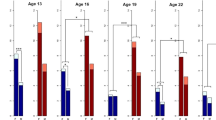Abstract
The present study examined beliefs about health and illness among a sample of 101 healthy children and young adolescents, from 8 to 14 years old. Respondents were administered a series of open- and closed-ended interview questions and were asked to draw a picture of a sick person. Various dimensions of health and illness were examined, including definition, concern, susceptibility, and locus of control. Several agelinked differences along these dimensions were found. Younger children were more concerned about their health and maintained a more external health locus of control, yet tended to rate their health more positively than older respondents. Younger children also tended to define illness from a more concrete, present-oriented, and symptom-specific, perspective. No effects of gender, self-reported illness experience, or family illness experience were found. Implications for the design of preventive health interventions and for future research are discussed.
Similar content being viewed by others
References
Becker, M.N., Haefner, D.P., Kasl, S.V., Kirscht, J.P., Maiman, L.A., & Rosenstock, I.M. (1977). Selected psychosocial models and correlates of individual health-related behaviors.Medical Care, 5 (suppl.), 27–45.
Bibace, R., & Walsh, M.E. (1979). Developmental stages in children's conceptions of illness. In G.C. Stone, F. Cohen, & N.E. Adler (Eds.),Health psychology. San Francisco: Jossey-Bass.
Bruhn, J.G., & Parcel, G.S. (1982). Current knowledge about the health behavior of young children: A conference summary.Health Education Quarterly, 9(2 & 3), 142/238–166/262.
Campbell, J.D. (1975). Illness is a point of view: The development of children's concepts of illness.Child Development, 46, 92–100.
Dielman, T.E., Leech, S.L., Becker, M.H., Rosenstock, I.M., Horvath, W.J., & Radius, S.M. (1980). Dimensions of children's health beliefs.Health Education Quarterly, 7, 219–238.
Engel, G.L. (1977). The need for a new medical model: A challenge for biomedicine.Science, 196, 129–136.
Furman, W., & Bierman, K.L. (1983). Developmental changes in young children's conceptions of friendship.Child Development, 54, 549–556.
Gochman, D.S. (1982). Labels, systems and motives: Some perspectives for future research programs.Health Education Quarterly, 9(2 & 3), 167/263–174/270.
Gochman, D.S., & Saucier, J.R. (1982). Perceived vulnerability in children and adolescents.Health Education Quarterly, 9(2 & 3), 46/142–59/155.
Kalnins, I., & Love, R. (1982). Children's concepts of health and illness—and implications for health education: An overview.Health Education Quarterly, 9(2 & 3), 8/104–19/115.
Kegeles, S.S. (1980). The health belief model and personal health behavior.Social Science and Medicine, 14C, 227–229.
Kegeles, S.S., & Lund, A.K. (1982). Adolescents' health beliefs and acceptance of a novel preventive dental activity: Replication and extension.Health Education Quarterly, 9(2 & 3), 96/192–112/208.
Kister, M.C. & Patterson, C.J. (1980). Children's conceptions of the causes of illness: Understanding of contagion and use of immanent justice.Child Development, 51, 839–846.
Matarazzo, J.D. (1983). Education and training in health psychology: Boulder or bolder?Health Psychology, 2(1), 73–114.
Nagy, J.H. (1951). Children's ideas of the origin of illness.Health Education Journal, 9, 6–12.
Natapoff, J.N. (1982). A developmental analysis of children's ideas of health.Health Education Quarterly, 9(2 & 3), 34/130–45/141.
Parcel, G.S., & Meyer, M.P. (1978). Development of an instrument to measure children's health locus of control.Health Education Monograph, 6(2), 149–159.
Perrin, E.C. & Gerrity, P.S. (1981). There's a demon in your belly: Children's understanding of illness.Pediatrics, 67(6), 841–849.
Rothman, A.I. & Byrne, N. (1981). Health education for children and adolescents.Review of Educational Research, 51(1), 85–100.
Singer, D.G. & Revenson, T.A. (1978).A Piaget primer: How a child thinks. New York: International Universities Press.
Tessler, R. & Mechanic, D. (1978). Psychological distress and perceived health status.Journal of Health and Social Behavior, 19, 254–262.
Thompson, E.L. (1978). Smoking education programs 1960–1976.American Journal of Public Health, 68, 250–257.
Weisenberg, M., Kegeles, S.S., & Lund, A.K. (1980). Children's health beliefs and acceptance of a dental preventive activity.Journal of Health and Social Behavior, 21, 59–74.
Author information
Authors and Affiliations
Additional information
The order of the authors names is alphabetical. The authors thank Edward Siedman for his helpful comments on an earlier draft of the manuscript.
David G. Altman is a postdoctoral fellow at the Stanford Center for Research in Disease Prevention. Tracey A. Revenson is an Assistant Professor of Psychology, Barnard College of Columbia University.
Rights and permissions
About this article
Cite this article
Altman, D.G., Revenson, T.A. Children's understanding of health and illness concepts: a preventive health perspective. J Primary Prevent 6, 53–67 (1985). https://doi.org/10.1007/BF01325340
Issue Date:
DOI: https://doi.org/10.1007/BF01325340



